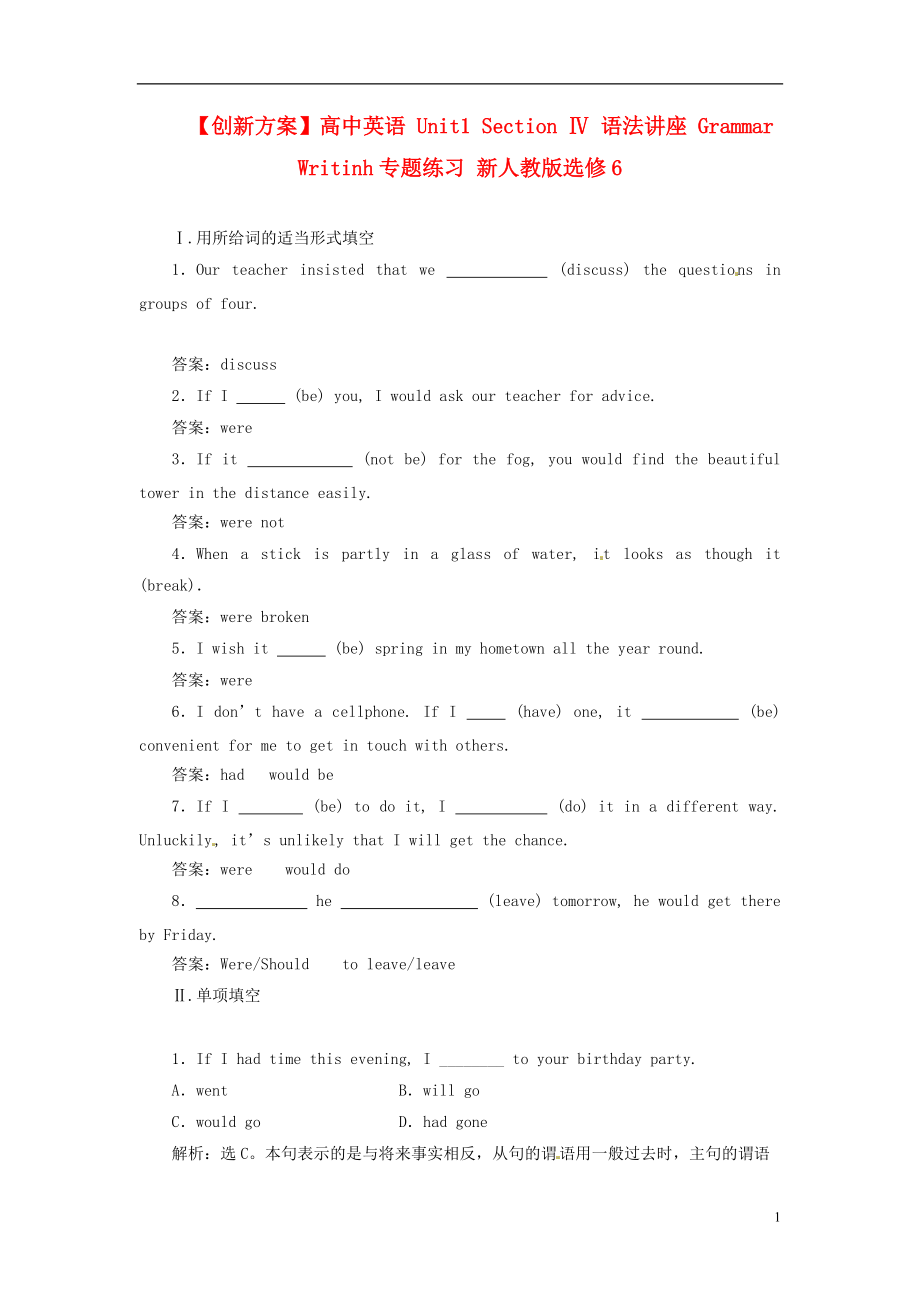《【創(chuàng)新方案】高中英語(yǔ) Unit1 Section Ⅳ 語(yǔ)法講座 Grammar Writinh專題練習(xí) 新人教版選修6》由會(huì)員分享��,可在線閱讀��,更多相關(guān)《【創(chuàng)新方案】高中英語(yǔ) Unit1 Section Ⅳ 語(yǔ)法講座 Grammar Writinh專題練習(xí) 新人教版選修6(3頁(yè)珍藏版)》請(qǐng)?jiān)谘b配圖網(wǎng)上搜索��。
1����、
【創(chuàng)新方案】高中英語(yǔ) Unit1 Section Ⅳ 語(yǔ)法講座 Grammar Writinh專題練習(xí) 新人教版選修6
Ⅰ.用所給詞的適當(dāng)形式填空
1.Our teacher insisted that we (discuss) the questions in groups of four.
答案:discuss
2.If I (be) you, I would ask our teacher for advice.
答案:were
3.If it (not be) for the fog, you would
2�����、 find the beautiful tower in the distance easily.
答案:were not
4.When a stick is partly in a glass of water, it looks as though it (break).
答案:were broken
5.I wish it (be) spring in my hometown all the year round.
答案:were
6.I don’t have a cellphone. If I (have) one, it
3�、 (be) convenient for me to get in touch with others.
答案:had would be
7.If I (be) to do it, I (do) it in a different way. Unluckily, it’s unlikely that I will get the chance.
答案:were would do
8. he (leave) tomorrow, he would get ther
4、e by Friday.
答案:Were/Should to leave/leave
Ⅱ.單項(xiàng)填空
1.If I had time this evening, I ________ to your birthday party.
A.went B.will go
C.would go D.had gone
解析:選C��。本句表示的是與將來(lái)事實(shí)相反��,從句的謂語(yǔ)用一般過(guò)去時(shí),主句的謂語(yǔ)應(yīng)用“would+動(dòng)詞原形”���。
2.All the doctors in the hospital insisted that he ________ badly woun
5、ded and that he ________ at once.
A.should be; be operated on
B.were; must be operated on
C.was; should be operated
D.was; be operated on
解析:選D���?����?疾閕nsist在表達(dá)不同意義時(shí)的虛擬和不虛擬的情況��。insist意為“堅(jiān)持說(shuō)”時(shí)���,從句不用虛擬語(yǔ)氣;而它表示“堅(jiān)決要求”時(shí)�����,從句用虛擬語(yǔ)氣���。[
3.Our teacher suggested that we ________ over our corrected exercises before
6���、an important examination.
A.would go B.go
C.had better go D.went
解析:選B��。suggest表示“建議”時(shí)��,其后從句用“should+動(dòng)詞原形”��,should可省略�。[
4.If I ________ plan to do anything, I’d like to go to Tibet and travel through as much of it as possible.
A.will B.could
C.have to D.ought to
解析:選B��。對(duì)現(xiàn)在情
7����、況的假設(shè),虛擬條件句用一般過(guò)去時(shí)�����。根據(jù)句意選B項(xiàng)���。
5.Don’t come this morning, I would rather you ________ the day after tomorrow.
A.come B.came
C.a(chǎn)re to come D.will come
解析:選B�。would rather后的賓語(yǔ)從句用虛擬語(yǔ)氣���。
6.— What would you do if it ________ tomorrow?
— We have to carry it on since we’ve got everything ready.
8�、A.should rain B.has rained
C.will rain D.is raining
解析:選A。問(wèn)句是非真實(shí)條件句����,表示對(duì)將來(lái)情況的虛擬,從句謂語(yǔ)用“should do/were to do/did”����。
7.________ today, he would arrive in New York by Tuesday.
A.If he leaves B.If he is leaving
C.If he was leaving D.If he were to leave
解析:選D。對(duì)將來(lái)情況的假設(shè)�����,虛擬條件句用were to
9���、do sth.。
8.________ fired, your health care and other benefits will not be cut off.
A.Would you be B.Should you be[
C.Could you be D.Might you be
解析:選B�����?��?疾樘摂M條件句的倒裝結(jié)構(gòu)��。虛擬條件句的從句含有were, should或had時(shí)���,可省略if�����,把were, should或had移到從句的句首���,構(gòu)成倒裝結(jié)構(gòu)。句意:即使你被解雇了�����,醫(yī)療保障和其他福利也不會(huì)受到影響�����。
9.— Don’t you want to go t
10���、o a karaoke bar with us?
— I wish I ________�����, but I have an appointment.
A.may B.could
C.can D.should
解析:選B���。考查虛擬語(yǔ)氣。wish后的賓語(yǔ)從句要用虛擬語(yǔ)氣�����,即從句謂語(yǔ)動(dòng)詞用過(guò)去式表示現(xiàn)在或?qū)?lái)��;從句謂語(yǔ)用“had+過(guò)去分詞”表過(guò)去�����,而此句表示將來(lái)的情況����,故用could���。[
10.— Do you mind if we set out earlier tomorrow morning?
— Well, I’d rather you ________.
A.don’t B.didn’t
C.won’t D.wouldn’t
解析:選B�����。would rather后的從句用虛擬語(yǔ)氣��。根據(jù)上下文語(yǔ)境可知���,從句表示與將來(lái)事實(shí)相反,故此處用didn’t。
3
 【創(chuàng)新方案】高中英語(yǔ) Unit1 Section Ⅳ 語(yǔ)法講座 Grammar Writinh專題練習(xí) 新人教版選修6
【創(chuàng)新方案】高中英語(yǔ) Unit1 Section Ⅳ 語(yǔ)法講座 Grammar Writinh專題練習(xí) 新人教版選修6

